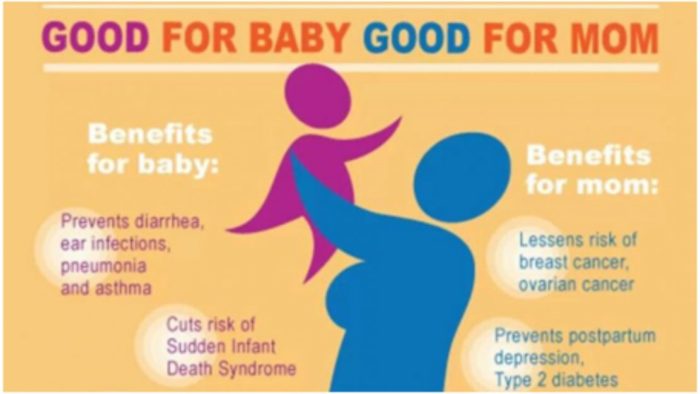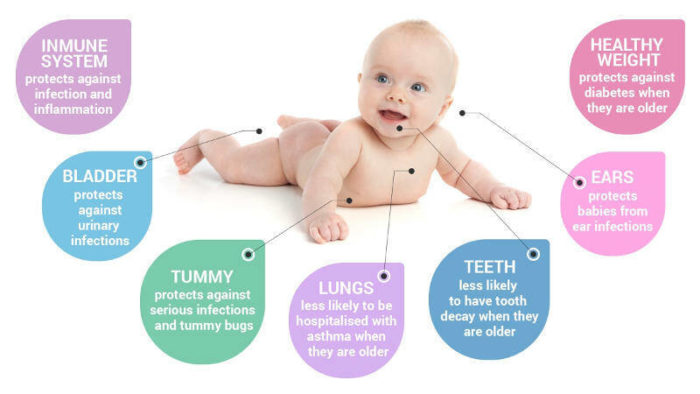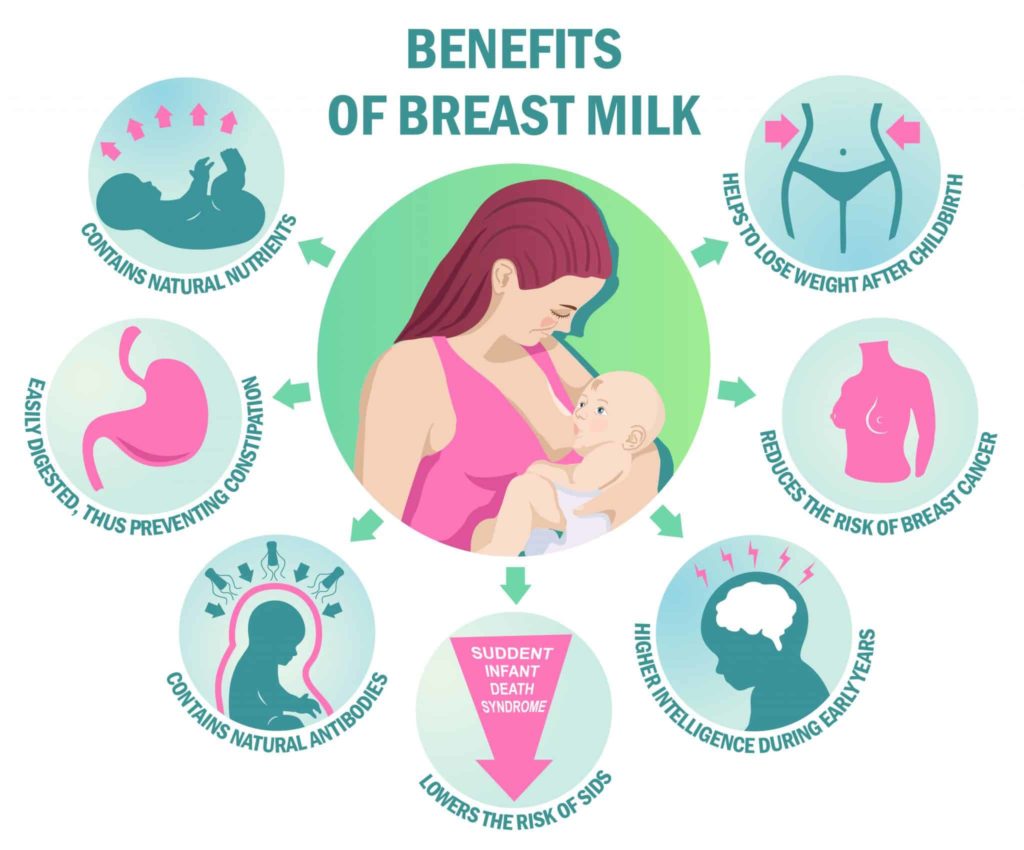Optimal Nutrition from Breast Milk
The perplexing and multifaceted nature of breast milk bestows upon infants the consummate nourishment they require for growth and development. With a multitude of benefits encompassing both mother and child, breastfeeding is a remarkable act that extends far beyond mere sustenance.

In the initial days following birth, mothers yield colostrum – an ambrosial liquid teeming with antibodies and fortifying properties. As moments unfurl, the maternal wellspring transitions to mature breast milk; continually adapting to fulfill the evolving nutritional demands of their burgeoning offspring.
Health professionals extol exclusive breastfeeding during an infant’s inaugural six-month span due to its unrivaled health advantages. The alchemy within this natural elixir comprises proteins, fats, carbohydrates, vitamins, minerals as well as singular components such as live cells and enzymes – elements unattainable through formula or other food sources. These constituents harmonize in synergy to proffer holistic defense against various maladies while nurturing overall wellness throughout infancy into childhood.
But lo! The merits of breastfeeding transcend mere nutrition – they envelop short-term and long-term boons for both progeny and parent alike. Consistent research reveals that exclusively breastfed babes encounter fewer instances of gastrointestinal tribulations like diarrhea or constipation than those who partake in formula or cow’s milk products alone. Furthermore, studies evince heightened cognitive development among nurslings when juxtaposed with those sustained on alternative options such as infant formula – accentuating yet another momentous benefit derived directly from this organic provision bestowed by maternal caregiving endeavors.
Supporting a Strong Immune System
Ah, the wondrous complexities of breastfeeding and its remarkable capacity to bolster a robust immune fortress for infants! A veritable cornucopia of antibodies and other immune-enhancing marvels dwell within breast milk, valiantly aiding your baby in repelling infections and maladies. By offering your child this unparalleled commencement in life through essential nourishment, you foster their optimal health. Furthermore, research unveils that those nurtured by breast milk harbor diminished odds of encountering an array of afflictions later on – such as asthma, allergies, type 2 diabetes, and even the harrowing sudden infant death syndrome.

But lo! Breastfeeding may also bestow long-term boons upon maternal health. Scientific inquiries reveal that mothers who nurse their offspring possess a lesser susceptibility to breast and ovarian cancer in future years. Moreover, the act of nursing cultivates an emotional tether between mother and child – beneficial not solely for the infant’s development but also nurturing well-being amidst both mother and babe.
Let us not forget that each instance wherein your baby craves sustenance or signals their need for nourishment presents an invaluable opportunity to gift them with the precious nutrients dwelling within breast milk. Persisting with breastfeeding throughout their inaugural year (and beyond if so desired), you shall ensure they obtain every critical ingredient necessary for cultivating a vigorous immune system while reaping supplementary rewards associated with this organic form of sustenance – encompassing cognitive growth enhancement alongside fostering emotional bonds betwixt parent-child duos alike.
Reduced Risk of Sudden Infant Death Syndrome (SIDS)
Breastfeeding, a practice enshrouded in the mysteries of life-giving sustenance, appears to hold the key to reducing the perplexing occurrence of Sudden Infant Death Syndrome (SIDS) – an inexplicable tragedy affecting infants under one year old. The venerable American Academy of Pediatrics extols the virtues of exclusive breastfeeding for at least six months, with a gradual introduction of solid food while continuing this nourishing endeavor until 12 months or beyond. Oxytocin, that wondrous hormone unleashed during lactation, bestows upon the mother steadier blood pressure and diminished stress levels – crucial elements in fashioning a secure slumber haven for her precious offspring.
The elixir that is human milk offers indispensable nutrients and antibodies – veritable sentinels fortifying an infant’s burgeoning immune system. Such protection against infection proves invaluable amidst early infancy when these fragile beings are most vulnerable to maladies’ relentless advances. Furthermore, breastmilk harbors constituents fostering salubrious gut bacteria growth — agents combating inflammation whilst mitigating later-life risks associated with chronic ailments such as asthma, allergies, type 2 diabetes, and elevated blood pressure.
Breastfeeding transcends mere physiological benefits; it also fosters emotional connections between mother and child through tender skin-to-skin contact experienced during nursing interludes. Employing breast pumps empowers working mothers or those grappling with latching tribulations or meager milk supply to provide their infants with human milk rather than capitulating exclusively to formula feeding. It is thus paramount for novice parents embarking on this breastfeeding journey to seek counsel from healthcare professionals like lactation consultants or pediatricians who can impart wisdom on proper techniques and assuage concerns surrounding this vital facet of infant care.
Promotion of Healthy Growth and Development
Breastfeeding bestows a cornucopia of boons, nurturing the blossoming of infantile health and development. One remarkable merit lies in breast milk’s rich tapestry of vital nutrients, vitamins, and minerals – an elixir for thriving during the tender first six months. Embracing this ensures your cherished offspring relishes these life-sustaining elements in exquisite balance – an artful feat elusive to baby formula.
Moreover, this nourishing nectar adapts with time as your little one flourishes; catering bespoke sustenance at each milestone.
Beyond fulfilling nutritional demands for growth, breastfeeding bequeaths a shield against infections and maladies due to its unparalleled concoction. Infants nurtured by breast milk boast formidable immune systems compared with their formula-fed counterparts; thanks to antibodies and other immunity-enhancing wonders absent from synthetic substitutes. This fortification against commonplace childhood afflictions such as ear infections or respiratory woes curtails healthcare costs whilst fostering overall well-being.
An additional facet where breastfeeding bolsters healthy growth resides in diminishing obesity risk later in life – intimately entwined with chronic disease specters like heart disease or diabetes. Research unveils that unwavering commitment to exclusive breastfeeding for a minimum of six months trims down this peril significantly when juxtaposed with early initiation into baby formula feeding. Furthermore, studies intimate that children who reveled in maternal nourishment may enjoy heightened cognitive development and learning prowess relative to peers bereft of such natural nurture – accentuating yet another compelling rationale for championing this organic approach towards robust physical health throughout infancy’s journey and beyond.
Lower Risk of Asthma, Allergies, and Type Diabetes
The myriad health boons of breastfeeding transcend beyond merely proffering optimal nourishment for neonates. Studies unveil that breastfeeding bestows safeguarding against assorted chronic and acute maladies, encompassing asthma, allergies, and type 1 diabetes. The lacteal output engendered by a mother’s physique is customarily adapted to satiate her infant’s sui generis requisites; breast milk comprises antibodies that bolster your baby in combatting viruses and bacteria while fortifying overall immune system robustness.
A salient merit of breastfeeding lies in its capacity to diminish the susceptibility of manifesting asthma or allergies as life progresses. Women who nurse their offspring endow them with vital nutrients and biologically active constituents that can aid in warding off such afflictions. Research insinuates that breastfeeding curtails the peril of respiratory infections during infancy, which may consequently mitigate the probability of evolving into asthmatic conditions upon maturing further. Additionally, it has been discerned that infants who are exclusively breastfed for a minimum duration of six months exhibit reduced prevalence rates concerning allergies compared to those otherwise.
Breastfeeding can also contribute towards thwarting type 1 diabetes among children through proffering an array of corporeal and emotional benefits for both mothers and progeny alike. Neonates imbibing breast milk receive all necessary nutritional components requisite for apt growth, development, and immune function regulation – factors paramount in decreasing diabetes risk amid other ailments later on in existence. Moreover, this practice nurtures bonding betwixt mother and child; such an emotive linkage aids in ensuring the infant acquires sufficient care indispensable to flourish physically whilst underpinning mental well-being concurrently. In essence, integrating exclusive nursing within initial childcare regimens not solely imparts considerable short-term health enhancements but also fosters enduring benefits throughout one’s entire lifetime
Enhanced Cognitive Development and Learning Abilities
The perplexing realm of breastfeeding bestows a plethora of boons upon the cognitive maturation and learning prowess of tender infants. A myriad of research consistently illuminates that in the nurturing landscape for a child’s intellectual expansion, it is breastfeeding that reigns supreme – particularly during the initial half-year milestone. Within this pivotal epoch, nature’s liquid gold – breast milk – encompasses all quintessential nutrients and antibodies required to bolster cerebral growth and holistic vitality.
A temporal span of no less than six months dedicated to maternal nursing has been inextricably linked with enhanced cognitive outcomes as children blossom into their older selves. One fundamental rationale behind this intriguing connection lies in the fact that nursing acts as an impetus for neural connections within the infantile brain taking its maiden steps towards development. Moreover, parents who embrace breastfeeding often find themselves enveloped by increased bonding with their tiny offspring through tactile skin-to-skin contact and soulful eye gazing – elements thought to be intertwined with heightened emotional intellect among children. The bountiful advantages for both neonates and mothers transcend mere cognitive gains; indeed, they encompass diminished probabilities of breast and ovarian cancer while expediting postnatal recovery for mothers.
It behooves us to acknowledge that each parent’s sojourn alongside their fledgling progeny shall undeniably be singular; nonetheless, placing emphasis on breastfeeding may proffer substantial long-term dividends not solely for your offspring but also yourself as nurturer or caregiver. By electing to nourish your babe at every opportunity throughout life’s inaugural year, you impart unparalleled sustenance whilst cultivating robust neurological bonds destined to serve them well amid their lifetime journey. Furthermore, by partaking in this intimate ritual, you contribute your share towards arming your little one against viral adversaries and infections – thereby enriching their overall wellbeing on their odyssey toward salubrious growth and blossoming maturity.\n
Bonding and Emotional Connection with the Mother
In the realm of maternal bonds and emotional ties, research unveils the paramount role that breastfeeding plays in establishing this vital connection between a mother and her offspring. Through close physical proximity during nursing sessions, an attachment blossoms which not only caters to the infant’s emotional well-being but also bestows copious benefits upon the mother herself. Indeed, milk production may serve to balance postpartum hormones, assuage stress levels, and even diminish susceptibility to certain health concerns such as breast cancer.
A noteworthy facet of this bond lies within its propensity for fostering communication betwixt mother and child. As hunger or solace is sought by the baby, their instincts guide them towards their mother’s bosom – refining both parties’ understanding of each other’s cues over time. Research insinuates that infants nourished by breastmilk are more inclined to develop secure attachments with caregivers compared to those fed formula; these interactions play no small part in shaping such outcomes. Furthermore, colostrum – nature’s initial gift of milk following birth – supplies antibodies crucial for constructing robust immune systems in newborns; consequently, breastfeeding decreases your infant’s likelihood of succumbing to sudden infant death syndrome (SIDS) along with myriad other health complications.
Beyond nurturing emotional connections and proffering essential nutrients conducive to growth and development lie several long-term boons associated with breastfeeding. Investigations reveal that children who were once breastfed frequently excel academically later on in life compared to their non-breastfed counterparts; moreover, these individuals might exhibit decreased propensities for developing chronic maladies such as asthma or type 2 diabetes eventually. This evidence illuminates merely a fraction of the abundant advantages linked with nursing one’s progeny – ranging from bolstering cognitive evolution early on through endorsing overall wellbeing across adulthood – emphasizing why mothers everywhere should endeavor whenever feasible prioritize feeding exclusively via breastmilk throughout infancy when little ones remain most vulnerable yet receptive to its plethora of offerings.
Contribution to Long-Term Health and Well-being
In the realm of motherhood, breastfeeding unfurls a tapestry of long-term health boons for both maternal and infant well-being, transcending mere infancy. One such reward rests in the cradle of exclusive breastfeeding, as it diminishes the likelihood of chronic ailments like obesity, type 2 diabetes, and cardiovascular disease sprouting later in life’s garden. This can be traced back to breast milk nurturing the precise balance of nutrients necessary for a baby’s growth and development throughout their inaugural half-year.
Moreover, nestled within breastfeeding lies an invaluable ally: bolstering immune fortitude. A veritable elixir brimming with antibodies and other immunity-enhancing agents, breast milk shields neonates against infections during those fragile first months when they are most susceptible. These stalwart defenses empower infants to vanquish viruses and bacteria more effectively than those reliant on formula or alternative nourishment sources. Studies illuminate that children who supped exclusively from nature’s cup for at least six moons tend to experience fewer respiratory maladies, ear afflictions, gastrointestinal quandaries; additionally avoiding allergies or asthma looming on life’s horizon.
Breastfeeding bestows significant contributions upon maternal vitality by hastening weight loss accrued during pregnancy—surpassing non-nursing counterparts’ pace. The act demands additional energy expenditure due to heightened metabolic requirements tethered to milk production; thus igniting weight loss while ensuring copious nutrient intake is maintained between mother-child dyads. Furthermore, this practice intertwines with diminished cancer risks (e.g., ovarian) among women who embrace it over alternate feeding paths—rendering breastfeeding an indispensable cornerstone in cultivating comprehensive wellness across one’s lifetime

